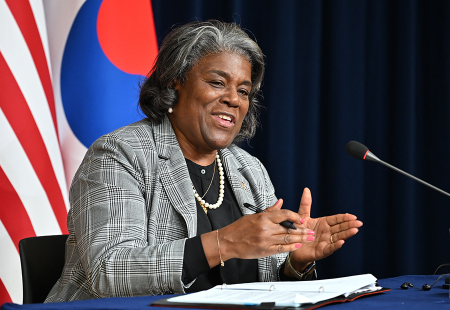"I want to tell you that your fact sheet on the [Missile Technology Control Regime] is very well done and useful for me when I have to speak on MTCR issues."
Russia Ends North Korean Sanctions Panel
May 2024
By Kelsey Davenport
Russia ended the mandate for a UN experts panel that assesses implementation of UN sanctions on North Korea by vetoing a Security Council resolution extending the panel’s mandate. The United States responded to Russia’s veto by announcing that Washington will find an alternative mechanism to investigate and report on North Korea sanctions enforcement.

The panel was established in 2009 under Security Council Resolution 1874 and comprises eight members appointed by the secretary-general. It assists the North Korea sanctions committee, known as the 1718 Committee, by analyzing information on sanctions noncompliance submitted by UN member states, making recommendations for more effective implementation of sanctions, and identifying individuals and entities for sanctions designations. The panel shares these findings in annual reports.
The mandate for the panel formally ended April 30, although the 1718 Committee will continue to operate and states still are legally required to implement Security Council sanctions on North Korea.
At the United Nations, Russian Ambassador Vasily Nebenzia defended the veto, accusing the West of trying to strangle North Korea using sanctions and describing the pressure-centric approach as “disconnected from reality.” He said that the panel has been “reduced to playing into the hands of Western approaches” and spreading “biased information.”
Russia supports “updating the sanctions regime” against North Korea, Nebenzia said.
Russia’s veto of the panel’s extension was not a surprise. Although the mandate generally has been renewed without controversy, Russia raised concerns about the panel during last year’s extension and sought to curtail its scope of work. Furthermore, Russia’s veto follows its blocking of Security Council action against North Korea for the past several years, despite Pyongyang advancing its nuclear and missile programs in violation of council provisions. (See ACT, May and July/August 2023.)
In a March 28 joint statement, France, Japan, South Korea, the United Kingdom, and the United States said that Russia’s veto of the resolution is “an attempt to silence independent, objective investigations” into violations of council resolutions. The statement accused Russia of ending the panel to prevent it from reporting on “Moscow’s own violations of Security Council resolutions” as it seeks North Korean military support for its “illegal war of aggression against Ukraine.”
North Korea is transferring weapons, including ballistic missiles, that Russia is using in its illegal war against Ukraine. (See ACT, March 2024.) UN sanctions prohibit North Korea from exporting arms.
The statement also asserted that ending the panel makes it “easier for [North Korea] to pursue nuclear weapons and their delivery systems” and emboldens Pyongyang to “continue its unlawful activity with a sense of impunity.”
Russia proposed changes to the draft resolution extending the mandate, which included a yearly renewal for sanctions provisions, but the United States opposed the proposal, saying Moscow insisted on “completely unacceptable conditions” and would not compromise.
China supported the Russian proposal, but abstained from voting on the resolution to extend the panel.
Nebenzia said that Russia will put forward an alternative resolution with an “update to the sanctions parameters.” But comments from U.S. officials suggest that Washington does not expect the proposal to pass the Security Council and is looking for alternative options for monitoring sanctions implementation.
U.S. Ambassador Linda Thomas-Greenfield, speaking to reporters during a trip to South Korea on April 17, said Russia continues to protect North Korea “from being held accountable” and that she does not expect Moscow to “cooperate or agree with any efforts to find another path” to monitor UN sanctions. Russia’s opposition will not stop the United States from working with partners to find an alternative to the panel, she said.
Thomas-Greenfield said the United States is looking at options “both inside and outside of the UN system” because the panel’s work cannot be allowed to “lapse.” She did not provide any details on the alternative mechanism that the United States
is considering.
She also pushed back against Russian accusations that sanctions are not effective. She said sanctions have “hampered” North Korea’s ability to “accomplish their goals.”
In its most recent report, the panel assessed that North Korea has “increased its self-sufficiency in the manufacture of equipment and components for the production of ballistic missiles.” But the March report concluded that Pyongyang still relies on illicit imports to obtain certain materials to advance its missile programs.
On April 2, North Korea tested a solid-fueled intermediate-range ballistic missile that it claimed carried maneuverable warheads. According to the state-run Korean Central News Agency (KCNA), the missile was a “new-type intermediate-range solid-fueled ballistic missile loaded with a newly-developed hypersonic glide vehicle.” KCNA reported the test as a success.
According to KCNA, North Korean leader Kim Jong Un attended the test and said it demonstrated the “absolute superiority” of North Korea’s military technology. The test proved the “three principles of building missile armed forces for rapidly, accurately and powerfully striking any enemy target” worldwide, Kim said.
Solid-fueled systems can be fired more quickly than those using liquid fuel, and maneuverable warheads are more difficult to intercept.
But manufacturing solid-fueled rocket motors comes with challenges. The March report from the UN experts panel noted that Pyongyang “will need solid-propellant materials in great volumes.” The panel assessed that North Korea may be able to produce some of the required materials but “likely remains dependent on foreign procurement” for others. It recommended that member states “redouble their efforts in preventing the supply” of certain prohibited items.
Following the April missile test, the United States, South Korea, and Japan staged a joint military exercise that included nuclear-capable bombers.
